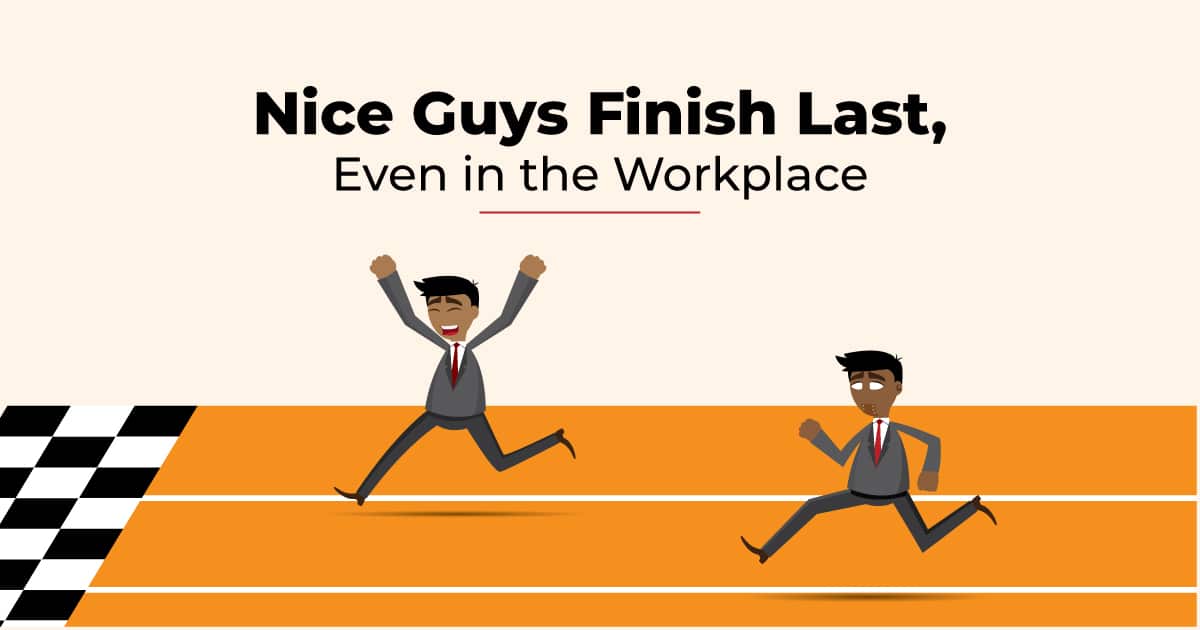All along, you have been conditioned that being nice is key to creating lasting relationships in the workplace. You are respectful, you never raise your voice and always try to be on everyone’s good side because you are a peace-loving person.
All these are good qualities to have as a person. However, it is wise to always draw a line on where your ‘niceness’ reaches. Just to clear any misunderstanding, we are not advocating for you to put down your natural nice disposition and adopt a rough exterior every time you walk into the office. We are not saying that you should suddenly drop your smile and wear a scowl, talk rough and even ruffle a few feathers.
All we’re saying is, sometimes being an overly nice person exposes you to people looking down on you, not taking you seriously and even labeling you the office pushover.
Table of Contents
Here are Signs That You are the Nice Guy in the Workplace
You Don’t Remember the Last Time You Said “No”

When was the last time you said no? Do you take on every task passed to you even when you lack capacity or the know-how, just because you don’t want to disappoint people? If you are the kind of person who always says yes, then there’s a problem.
Saying no is healthy. It shows a sense of purpose and commitment to current tasks or engagement. Sticking to your guns also shows good judgement, decisiveness and a sense of direction and purpose. Yes-people never actually get anything done because they will always stop what they’re doing to help someone else who asked for their help and they just couldn’t reschedule or plainly say no.
Way out: Start saying no today. It might be a bit foreign for you, seeing that it wasn’t part of your vocabulary before. Start by saying no to seemingly small things like when a colleague asks you to stop what you are doing and help them with their task.
Remember to be professional and firm. Don’t let your tone and body language border on corky and rude.
You Never Have an Opinion
You have been to several meetings and most of the time, when you are asked: “What do you think, Carol?” You somehow always wind up saying something in the lines of “ I support what Robert said earlier.” You never have your own opinion and are easily swayed by majority thinking.
Way out: You are where you are today because you have something in you that the world needs to see, hear and experience. Every time you belittle your ideas or opinions you shut down your own potential. You might be doing it unconsciously, but you need to understand that it stems from esteem issues and not believing in yourself. Every time someone asks for your opinion, they do want to hear YOUR opinion, even if it is not the best. It is your opinion. Own it. Now be careful to always back things you say in meetings with research done. S this means prepare before that boardroom meeting. Expect questions and always have 80% answers to all questions you can anticipate. Slowly you will begin to realise you are becoming a force to reckon with around you. You are becoming an expert.
You are Afraid of Confrontations

Boardrooms are corporate battlegrounds where ideas are born, nurtured, grown and even sometimes killed. It is the normal process of corporate culture. People hold meetings to discuss strategy, make execution plans, monitor progress and set aside things are not working while adopting those that push targets forward. If you are an overly nice person, boardrooms and meetings are not your best places in the workplace because you don’t like anything close to an argument or confrontation.
Way out: When working with strong personalities, it might be a little bit intimidating at times. Listening to what they have to say is important, but don’t let them lock you out of the discussions. Don’t just sit there and fade into their back and forth’s. Seek to be hard and state your thoughts very clearly and firmly. Remember the key is to be heard, not to be right. Whatever angle your idea is taking, it is worth being considered so don’t sit with and hope someone else will mention it so you can back them.
You go to Extra Ordinary Lengths to Please People
Are you that person who would do something that takes too much time or energy just to make someone else happy? And no, we are not asking about your significant other or a loved one. A colleague in the workplace. Do you take it upon yourself to be the office Superman? When someone is stuck on a task you are by their side with solutions, when someone else isn’t sure what to eat for lunch you have already offered to drive them to a nearby cafe? When do you have time to do your tasks? If you are always readily available to help people, take a step back and look inward. Something is wrong.
Way out: Start by seeing your self as a resource to the company you work for. For this resource (which is you) to assist in a task that is outside your own, what happens to your own tasks? Also, are you gaining anything from all this helping? Begin applying the 80-20 principle on tasks that aren’t yours. What are you gaining and what are you losing? You are paid for your hours at work. If you spend 80% of the time being nice to people your scorecard will show at the end of the quarter. And sadly, the people you were nice to will not chip in to push your index up.
You have Gone Through a Niceness Burn Out at Some Point

Being nice to everyone is exhausting. People are different, with different needs and you are so nice you want to fulfill all these needs and still ace your employee score card. You are bound to reach the breaking point where so many requests are coming in, you can say no and now you are neck-deep in things-to-do. Since people are not used to you failing them, they will start putting pressure on you wondering why you are not doing what you usually do. At this point you feel like you are going mad. You have two options; suck it in and work the whole night if you have to, or start reclaiming yourself at that point and say no, i have enough on my plate.
In short,
It is hard admitting your own shortcomings, but it usually the first step into recovery. Being nice is okay. Being overly nice that it compromises your skills, unique point of view and even position as a qualified professional is harmful. This is a habit that takes emotional and behavioral adjustments and you will have to consciously put in the effort to break free from all harmful habits that hold you back from attaining your full potential. Remember all nice, yes-people remain on the ground as those who are decisive and stand their ground even in the face of adversity go high up. It’s not a question of where you want to be, it’s what you are willing to break free from to get there.





